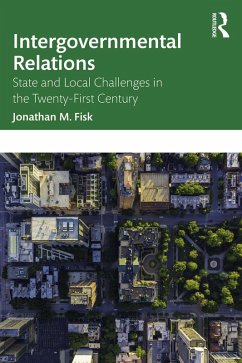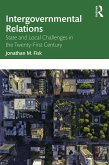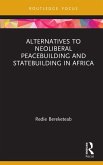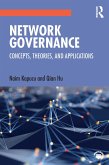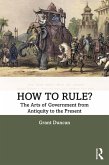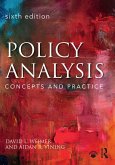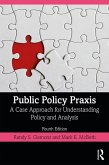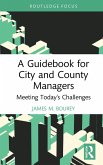Jonathan M. Fisk
Intergovernmental Relations (eBook, PDF)
State and Local Challenges in the Twenty-First Century
38,95 €
38,95 €
inkl. MwSt.
Sofort per Download lieferbar

19 °P sammeln
38,95 €
Als Download kaufen

38,95 €
inkl. MwSt.
Sofort per Download lieferbar

19 °P sammeln
Jetzt verschenken
Alle Infos zum eBook verschenken
38,95 €
inkl. MwSt.
Sofort per Download lieferbar
Alle Infos zum eBook verschenken

19 °P sammeln
Jonathan M. Fisk
Intergovernmental Relations (eBook, PDF)
State and Local Challenges in the Twenty-First Century
- Format: PDF
- Merkliste
- Auf die Merkliste
- Bewerten Bewerten
- Teilen
- Produkt teilen
- Produkterinnerung
- Produkterinnerung

Bitte loggen Sie sich zunächst in Ihr Kundenkonto ein oder registrieren Sie sich bei
bücher.de, um das eBook-Abo tolino select nutzen zu können.
Hier können Sie sich einloggen
Hier können Sie sich einloggen
Sie sind bereits eingeloggt. Klicken Sie auf 2. tolino select Abo, um fortzufahren.

Bitte loggen Sie sich zunächst in Ihr Kundenkonto ein oder registrieren Sie sich bei bücher.de, um das eBook-Abo tolino select nutzen zu können.
This book examines the sources behind state-local conflict to better understand where this critical intergovernmental relationship may be breaking down, and to ultimately identify solutions and policy tools that build upon the strengths of state and local governments, mitigate conflicts, and improve the quality of life for citizens.
- Geräte: PC
- ohne Kopierschutz
- eBook Hilfe
- Größe: 5.48MB
Andere Kunden interessierten sich auch für
![Intergovernmental Relations (eBook, ePUB) Intergovernmental Relations (eBook, ePUB)]() Jonathan M. FiskIntergovernmental Relations (eBook, ePUB)38,95 €
Jonathan M. FiskIntergovernmental Relations (eBook, ePUB)38,95 €![Alternatives to Neoliberal Peacebuilding and Statebuilding in Africa (eBook, PDF) Alternatives to Neoliberal Peacebuilding and Statebuilding in Africa (eBook, PDF)]() Redie BereketeabAlternatives to Neoliberal Peacebuilding and Statebuilding in Africa (eBook, PDF)21,95 €
Redie BereketeabAlternatives to Neoliberal Peacebuilding and Statebuilding in Africa (eBook, PDF)21,95 €![Network Governance (eBook, PDF) Network Governance (eBook, PDF)]() Naim KapucuNetwork Governance (eBook, PDF)38,95 €
Naim KapucuNetwork Governance (eBook, PDF)38,95 €![How to Rule? (eBook, PDF) How to Rule? (eBook, PDF)]() Grant DuncanHow to Rule? (eBook, PDF)38,95 €
Grant DuncanHow to Rule? (eBook, PDF)38,95 €![Policy Analysis (eBook, PDF) Policy Analysis (eBook, PDF)]() David WeimerPolicy Analysis (eBook, PDF)109,95 €
David WeimerPolicy Analysis (eBook, PDF)109,95 €![Public Policy Praxis (eBook, PDF) Public Policy Praxis (eBook, PDF)]() Randy ClemonsPublic Policy Praxis (eBook, PDF)57,95 €
Randy ClemonsPublic Policy Praxis (eBook, PDF)57,95 €![A Guidebook for City and County Managers (eBook, PDF) A Guidebook for City and County Managers (eBook, PDF)]() James M. BoureyA Guidebook for City and County Managers (eBook, PDF)20,95 €
James M. BoureyA Guidebook for City and County Managers (eBook, PDF)20,95 €-
-
-
This book examines the sources behind state-local conflict to better understand where this critical intergovernmental relationship may be breaking down, and to ultimately identify solutions and policy tools that build upon the strengths of state and local governments, mitigate conflicts, and improve the quality of life for citizens.
Dieser Download kann aus rechtlichen Gründen nur mit Rechnungsadresse in A, B, BG, CY, CZ, D, DK, EW, E, FIN, F, GR, HR, H, IRL, I, LT, L, LR, M, NL, PL, P, R, S, SLO, SK ausgeliefert werden.
Produktdetails
- Produktdetails
- Verlag: Taylor & Francis
- Seitenzahl: 260
- Erscheinungstermin: 14. Juni 2022
- Englisch
- ISBN-13: 9781000554946
- Artikelnr.: 63722731
- Verlag: Taylor & Francis
- Seitenzahl: 260
- Erscheinungstermin: 14. Juni 2022
- Englisch
- ISBN-13: 9781000554946
- Artikelnr.: 63722731
- Herstellerkennzeichnung Die Herstellerinformationen sind derzeit nicht verfügbar.
Jonathan M. Fisk is an Associate Professor in the Department of Political Science at Auburn University, USA, where he teaches courses on public personnel management, environmental politics, ethics and leadership, local government, and federalism as well as being the Faculty Advisor to the Auburn student chapter of the International City and County Management Association. He is also the Chairperson for the American Society for Public Administration's Section on Environment and Natural Resource Administration. He is the author of The Fracking Debate: Intergovernmental Politics of the Oil and Gas Renaissance (Routledge, 2017) and his research has appeared in: American Review of Public Administration, State and Local Government Review, Society and Natural Resources, Politics and Policy, Energy Policy, Public Integrity, and Review of Policy Research.
Preface 1. Introducing State and Local Governments 2. Unpacking State and
Local Conflict 3. The City of Longmont and the Politics of Unconventional
Oil and Gas in Colorado 4. The City of Brownsville and Plastic Bag Politics
in Texas 5. The City of Houston and Air Pollution Politics in Texas 6. The
City of St. Petersburg and Climate Change Politics in Florida 7. The City
of Birmingham, AL and the Politics of Monuments and Confederate Statues in
Alabama 8. The City of Charlotte and the Politics of 'Bathroom Bills' in
North Carolina 9. The City of Kansas City and Uber Politics in Missouri 10.
The City of Santa Monica and Form of Government Politics in California 11.
The City of Minneapolis and Wage Politics in Minnesota 12. The City of
Pittsburgh and Paid Sick Leave Politics in Pennsylvania 13. The City of
Cleveland and Local Hiring Politics in Ohio 14. The City of Columbia and
Property Tax Politics in South Carolina 15. The City of Coronado and
Regional Housing Politics in California 16. Summary and Lessons Learned
Local Conflict 3. The City of Longmont and the Politics of Unconventional
Oil and Gas in Colorado 4. The City of Brownsville and Plastic Bag Politics
in Texas 5. The City of Houston and Air Pollution Politics in Texas 6. The
City of St. Petersburg and Climate Change Politics in Florida 7. The City
of Birmingham, AL and the Politics of Monuments and Confederate Statues in
Alabama 8. The City of Charlotte and the Politics of 'Bathroom Bills' in
North Carolina 9. The City of Kansas City and Uber Politics in Missouri 10.
The City of Santa Monica and Form of Government Politics in California 11.
The City of Minneapolis and Wage Politics in Minnesota 12. The City of
Pittsburgh and Paid Sick Leave Politics in Pennsylvania 13. The City of
Cleveland and Local Hiring Politics in Ohio 14. The City of Columbia and
Property Tax Politics in South Carolina 15. The City of Coronado and
Regional Housing Politics in California 16. Summary and Lessons Learned
Preface 1. Introducing State and Local Governments 2. Unpacking State and Local Conflict 3. The City of Longmont and the Politics of Unconventional Oil and Gas in Colorado 4. The City of Brownsville and Plastic Bag Politics in Texas 5. The City of Houston and Air Pollution Politics in Texas 6. The City of St. Petersburg and Climate Change Politics in Florida 7. The City of Birmingham, AL and the Politics of Monuments and Confederate Statues in Alabama 8. The City of Charlotte and the Politics of 'Bathroom Bills' in North Carolina 9. The City of Kansas City and Uber Politics in Missouri 10. The City of Santa Monica and Form of Government Politics in California 11. The City of Minneapolis and Wage Politics in Minnesota 12. The City of Pittsburgh and Paid Sick Leave Politics in Pennsylvania 13. The City of Cleveland and Local Hiring Politics in Ohio 14. The City of Columbia and Property Tax Politics in South Carolina 15. The City of Coronado and Regional Housing Politics in California 16. Summary and Lessons Learned
Preface 1. Introducing State and Local Governments 2. Unpacking State and
Local Conflict 3. The City of Longmont and the Politics of Unconventional
Oil and Gas in Colorado 4. The City of Brownsville and Plastic Bag Politics
in Texas 5. The City of Houston and Air Pollution Politics in Texas 6. The
City of St. Petersburg and Climate Change Politics in Florida 7. The City
of Birmingham, AL and the Politics of Monuments and Confederate Statues in
Alabama 8. The City of Charlotte and the Politics of 'Bathroom Bills' in
North Carolina 9. The City of Kansas City and Uber Politics in Missouri 10.
The City of Santa Monica and Form of Government Politics in California 11.
The City of Minneapolis and Wage Politics in Minnesota 12. The City of
Pittsburgh and Paid Sick Leave Politics in Pennsylvania 13. The City of
Cleveland and Local Hiring Politics in Ohio 14. The City of Columbia and
Property Tax Politics in South Carolina 15. The City of Coronado and
Regional Housing Politics in California 16. Summary and Lessons Learned
Local Conflict 3. The City of Longmont and the Politics of Unconventional
Oil and Gas in Colorado 4. The City of Brownsville and Plastic Bag Politics
in Texas 5. The City of Houston and Air Pollution Politics in Texas 6. The
City of St. Petersburg and Climate Change Politics in Florida 7. The City
of Birmingham, AL and the Politics of Monuments and Confederate Statues in
Alabama 8. The City of Charlotte and the Politics of 'Bathroom Bills' in
North Carolina 9. The City of Kansas City and Uber Politics in Missouri 10.
The City of Santa Monica and Form of Government Politics in California 11.
The City of Minneapolis and Wage Politics in Minnesota 12. The City of
Pittsburgh and Paid Sick Leave Politics in Pennsylvania 13. The City of
Cleveland and Local Hiring Politics in Ohio 14. The City of Columbia and
Property Tax Politics in South Carolina 15. The City of Coronado and
Regional Housing Politics in California 16. Summary and Lessons Learned
Preface 1. Introducing State and Local Governments 2. Unpacking State and Local Conflict 3. The City of Longmont and the Politics of Unconventional Oil and Gas in Colorado 4. The City of Brownsville and Plastic Bag Politics in Texas 5. The City of Houston and Air Pollution Politics in Texas 6. The City of St. Petersburg and Climate Change Politics in Florida 7. The City of Birmingham, AL and the Politics of Monuments and Confederate Statues in Alabama 8. The City of Charlotte and the Politics of 'Bathroom Bills' in North Carolina 9. The City of Kansas City and Uber Politics in Missouri 10. The City of Santa Monica and Form of Government Politics in California 11. The City of Minneapolis and Wage Politics in Minnesota 12. The City of Pittsburgh and Paid Sick Leave Politics in Pennsylvania 13. The City of Cleveland and Local Hiring Politics in Ohio 14. The City of Columbia and Property Tax Politics in South Carolina 15. The City of Coronado and Regional Housing Politics in California 16. Summary and Lessons Learned
